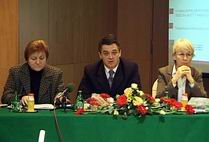- Serbia
Get to know Serbia
- Citizens
Culture and science
Health services
Pension and disability insurance
- Business
Employment
Economy
- Media
- Government
- Contact
Keep in touch
Contact form
Back
Keepin touch
Whether you have a question, comment, suggestion or any problem in the purview of the government, send us your message and we will try to respond as soon as possible. If your problem is not in our purview, we will forward your message to the relevant institution.
Q:
A:
Protecting pregnancies against transfer of HIV
Belgrade,
25 January 2005
Serbian Minister of Health Tomica Milosavljevic said today that 20 to 60 pregnant women are diagnosed with HIV every year and that it is necessary to take measures to prevent virus transmission to the child.
Milosavljevic told a press conference that it is possible to prevent infection in newly-born infants by testing mothers in a timely manner and by using of adequate therapy for preventing virus transmission in the baby, which had not been used until recently.
According to estimates of the Serbian Institute for Health Protection, if preventive measures are not taken, there will be from 7 to 22 HIV positive newly-born infants every year.
Minister Milosavljevic said that the project "Prevention of the Vertical Transmission of HIV Virus", which was implemented in October last year in New Belgrade and Kragujevac, has produced positive results, because four out of five HIV positive mothers gave birth to healthy children. Milosavljevic stressed that the yet to be adopted national strategy for HIV and AIDS introduced a measure of voluntary HIV testing of pregnant women instead of the previous testing trigger, namely an epidemiological assessment by a doctor.
This programme will help reduce the number of infected infants, and it will be cost-effective in the long run because costs for high-priced medicines will be reduced.
UNICEF Director for Serbia-Montenegro Ann Lis-Svensson said that recommendations and measures contained in international documents and declarations on the prevention of vertical transmission of HIV infection proposed to and accepted by Serbia-Montenegro aim to reduce the number of infected infants by 20 percent in 2005 and 50 percent by 2010.
According to Svensson, the number of women infected with HIV is trending upwards.
However, the risk of transmitting the virus to the infant, which is between 30 and 40 percent, can be reduced to two percent with adequate therapy.
According to estimates of the Serbian Institute for Health Protection, if preventive measures are not taken, there will be from 7 to 22 HIV positive newly-born infants every year.
Minister Milosavljevic said that the project "Prevention of the Vertical Transmission of HIV Virus", which was implemented in October last year in New Belgrade and Kragujevac, has produced positive results, because four out of five HIV positive mothers gave birth to healthy children. Milosavljevic stressed that the yet to be adopted national strategy for HIV and AIDS introduced a measure of voluntary HIV testing of pregnant women instead of the previous testing trigger, namely an epidemiological assessment by a doctor.
This programme will help reduce the number of infected infants, and it will be cost-effective in the long run because costs for high-priced medicines will be reduced.
UNICEF Director for Serbia-Montenegro Ann Lis-Svensson said that recommendations and measures contained in international documents and declarations on the prevention of vertical transmission of HIV infection proposed to and accepted by Serbia-Montenegro aim to reduce the number of infected infants by 20 percent in 2005 and 50 percent by 2010.
According to Svensson, the number of women infected with HIV is trending upwards.
However, the risk of transmitting the virus to the infant, which is between 30 and 40 percent, can be reduced to two percent with adequate therapy.
-
 Belgrade, 26 November 2025
Belgrade, 26 November 2025Serbia-Hungary partnership best example of European cooperation
-
 Belgrade, 22 January 2025
Belgrade, 22 January 2025Egypt one of Serbia’s closest partners on international stage
-
 Belgrade, 9 July 2024
Belgrade, 9 July 2024Support for 104 associations in diaspora that preserve Serbian language, culture
-
 Belgrade, 15 April 2024
Belgrade, 15 April 2024Competition for StarTech grants open until 31 May
-
 Belgrade, 2 October 2023
Belgrade, 2 October 2023Serbia respects Resolution 1244 and will do everything to preserve peace
-
 Belgrade, 13 September 2023
Belgrade, 13 September 2023Day of Serbian Unity to be celebrated outside borders of Serbia, Republika Srpska for the first time
-
 Belgrade, 8 August 2023
Belgrade, 8 August 2023RSD 24.2m in state aid paid out to citizens affected by storm
-
 Belgrade, 17 June 2023
Belgrade, 17 June 2023Belgrade is doing everything to preserve peace in Kosovo and Metohija
-
 Belgrade, 15 June 2023
Belgrade, 15 June 2023Slovenia will continue to support Serbia on its way to EU
-
 Belgrade, 5 May 2023
Belgrade, 5 May 2023Emergency measures, tightening of conditions for possessing weapons

